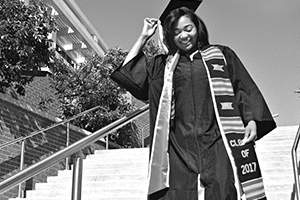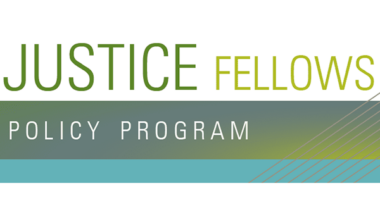Profile in Education Equity: Aneesh Sohoni, CEO, One Million Degrees
Jinann Bitar, director of higher education research at EdTrust, recently talked with Aneesh Sohoni, CEO of One Million Degrees (OMD), which is a leader in bolstering college completion rates and accelerating community college students’ economic mobility through innovative career pathway programs. Aneesh’s journey from classroom educator to transformative leader underscores his dedication to unlocking every student’s potential. With a wealth of experience in education reform across various sectors, including pivotal roles in designing statewide initiatives and leading nonprofit organizations, Aneesh brings a unique perspective to discussions about effective strategies for enhancing completion and fostering equitable opportunities for all learners and how policymakers can continue to invest in college completion. This interview has been edited and condensed for clarity.
In the past, you’ve written about what you call the “student success dividend” — and how closing equity gaps is a double bottom line investment for institutions that has financial and social benefits. Can you share more about what that means and why you think it’s important from an equity perspective?
There is a growing body of evidence to show that investments in holistic student support programs pay for themselves over time. I call that the “student success dividend.” Today’s students are the most diverse in our country’s history, in terms of their age, race, income, professional experiences, and family status. Meeting their complex needs comes with a cost, but so does our society’s collective failure to address the persistent disparities in student outcomes. Implementing wraparound student services and personnel to provide academic, career, mental-health, and other services adds to the bottom line, especially when institutions are under intense pressure to hold down tuition and expenditures. However, these supports can generate positive student success and financial outcomes that are often overlooked.
The most significant return on investment for schools, communities, and states comes when students who are the least likely to complete have the support they need to succeed. When students graduate on time, they can save money and more quickly advance into a career that will move them up the economic ladder. For institutions, greater student success pays off through improved retention, higher enrollment, and increased net tuition revenue. Investing in wraparound services designed to support students from low-income and under-represented backgrounds is not only an equity imperative, but also essential for the long-term success and financial sustainability of institutions.
To get more students to persist through graduation and toward career pathways, One Million Degrees (OMD) offers holistic student support to community college students. What are “whole-student supports” and why do they matter?
One Million Degrees is one of the few organizations in the country — and the only one in Illinois — providing what we call “whole-student supports” to community college students across four comprehensive need areas: financial, academic, personal, and professional. Supports range from basic-needs stipends, financial literacy counseling, academic interventions, and tutoring, to professional-development workshops and mentorship, and together those services provide a purposeful support system for our students. And that doesn’t even cover every support we offer.
As you know, community colleges can be a very powerful vehicle for social mobility in the United States and have played an outsized role in serving Black and Hispanic students from low-income backgrounds. There are so many barriers that often disproportionately affect students of color and students from low-income backgrounds that students cannot and should not be expected to face alone. That is why these supports matter — students thrive when they have access to supportive relationships in their community, and OMD has evidence to prove that.
Through your collaboration with City Colleges of Chicago, the program is now in its third year of a randomized control trial (RCT) led by the University of Chicago Urban Labs. Can you walk us through the early results?
This partnership between OMD and the University of Chicago Inclusive Economy Lab — one of five UC Urban Labs — was formed to evaluate the efficacy of our holistic approach to improving graduation rates and preparing students for professional success. Through a randomized controlled trial (RCT), the study will span eight years and ultimately seeks to provide causal evidence on whether our set of comprehensive services helps students graduate from college and succeed in the workforce.
The study has revealed that students benefit most when offered OMD supports — from tutors and coaches to financial assistance and professional development — early in the college entry and enrollment process. OMD participants who applied to the program before enrolling in college were 70% more likely to enroll, 94% more likely to persist through their first year, and 73% more likely to graduate in three years, compared to similar students who applied to the program but were not randomly selected to receive an offer to participate.
Early results from the RCT show a 94% increase in persistence through to the next school term for participating students. Why do you think this model is able to yield such strong results?
First, the comprehensiveness of our approach is part of what has led to these impressive gains. Given the demographics of students who enroll in higher education today, it’s often not a single issue or challenge that can derail their progress, but an interconnected web of psychosocial, academic, career, and other challenges. Part of the elegance of the One Million Degrees program and other similar wraparound support models is that we have a variety of resources and services under one roof that can flex and meet the needs of learners in ways that are both highly scalable, but also highly responsive to the needs of individual students.
Second, we do this work in an authentic, community-driven way, working hand-in-glove with staff, administrators, and educators at the City Colleges of Chicago and partners in the community. We are now in the process of rolling out this program as an opt-out service. Third, the rigor and fidelity with which we have built and scaled the program has been critical to our success.
What are some of the trends that you are watching related to holistic student support? How do you see this work evolving?
I am really excited about the conversations connecting education and work. The intersection between higher education, skills, and the world of work is a critical fulcrum point.
We’re seeing a surge of interest in ensuring that students are prepared for their first job through apprenticeship programs, including from tech giants like Amazon and Google. When done right, apprenticeship programs not only help companies address hiring challenges, but create pathways to long-term social and economic mobility for students who participate.
Collaboration between employers and institutions provides students with opportunities to gain valuable work experience, but it is also a vital part of shaping the way we prepare students for the jobs of today and the jobs of the future. At One Million Degrees, we’re focused on ensuring that students are prepared for careers and connected to jobs. We’ve always supported students’ professional success through our coaching and mentorship program. We’re doubling down on our supports, by providing students with career planning and exploration opportunities and improved access to work-based learning opportunities. These investments will help companies create a more diverse and inclusive workforce — and respond to the shifting demographics and demands of today’s labor market.
What can advocates glean from the data and evidence from programs like One Million Degrees to increase college completion for more students?
The most important thing to recognize when building a program like One Million Degrees is that every institution is different and has different needs. That is why the data and evidence is so important — because it equips those working in the space, be they institutions, nonprofits, or policymakers, with the right information to build out individualized programs.
This summer, we will be at the halfway mark of the RCT led by the University of Chicago Inclusive Economy Lab. At OMD, we are building a model, not a singular program. Each step in the research process helps us better understand why our model works, and how to adapt it to fit the conditions necessary to serve other students, institutions, and states. Ultimately, we want to see comprehensive student supports incorporated into practice, policies, and systems.







